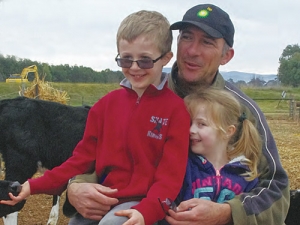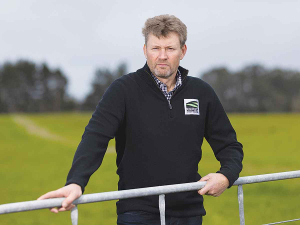A group of Gippsland, Victoria, dairy farmers are suggesting alternative recovery measures to those announced by the Federal Government.
The suggestion comes in a bid to better help dairy businesses raise cashflow and keep trading.
They spoke up at a meeting of Macalister Irrigation District (MID) dairyfarmers, United Dairyfarmer of Victoria representatives and government and banking officials. There are 500 dairy farmers in the MID, in Wellington shire.
Their top suggestion was that the government subsidise interest rates on existing mortgages and business loans, rather than expect dairy farmers to swap their debts to a government concessional loan scheme.
They argue that a farmer taking a government concessional loan would jeopardise his business relationship with his existing bank.
Rural Finance, which runs the government concessional loans scheme, would also require the farm's title as security, but the existing bank would be unlikely to release title by which they secure current loans.
It worries the farmers that many now in a growth or establishment phase of their business would be unable to access government loans because their bank debt exceeds $1 million.
The farmers' other concerns are their eligibility for concessional loans based on how long they have been in the dairy industry; the restricting of help to Australian citizens only; and drawing on farm management deposits without incurring tax penalty.
An interest rate subsidy on their existing farm debt would help a lot, say Brett Matthews and Jason and Casey Bermingham, Nambrok dairy farmers with young families.
"We've already lost our profit for this year and next, and we're now facing 18 months of pain knowing we're running at a loss," Matthews says. "An interest rate subsidy that you can tie to existing farm and business loans would help a lot.
"And whatever package is offered should be based on the same eligibility criteria for everyone – not just Australians and not only dairy farmers tied to Murray Goulburn and Fonterra."
Bermingham says subsidising the interest rate by 2.5% would make a huge difference.
"It would mean we could go back to basics and buy more fertiliser, grow more grass. It would support feed costs and give us much more flexibility in the business.
"We don't want to move our loans to another bank; we want to retain the existing relationship we have with our current bank; that's what's going to help us long term."
Alistair Clyne, of Tinamba West, says young farmers need the interest rate subsidy. "That will help a lot of people," he says.
Denison farmer Brad Missen emphasises that industry participants are each other's strength.
"We are resilient and we can help each other: borrowing dairy platforms and helping each other with harvest and milking," he says.
"It's up to us to come up with the solutions that will work for us in the next few seasons. Interest rate subsidies and help in retaining farm workers would free up cashflow and help keep a lot of dairyfarmers in the industry."
Missen and Heyfield dairyfarmer and Genetics Australia (GA) board member Trevor Henry want Dairy Australia to provide levy relief for farmers.
GA has already offered levy relief to farmers, based on a guarantee of 80% of herd size against breeding commitment.
"GA is a farmer cooperative and has a strong asset base so the board decided it was a way we could support our customers, relieving their AI cost and ensuring they could still get decent replacement heifers," Henry says.
"While it's an offer available only to shareholders, it can be taken up by new shareholders.
"Every organisation, if they can afford to, should use their reserves in a similar way: Dairy Australia could provide similar levy relief to dairy farmers and help free up cashflow.
"We want everyone to have a sustainable income."











